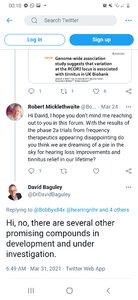I'm just not seeing how the severe hearing loss trial is going to show any major improvements.
This was disappointing. We can now limit the type of person it helps and the amount it helps if the severe hearing loss trial is successful.
I'm having an issue with this quote:
"To date, Frequency has shown statistically significant hearing benefits in multiple, independent FX-322 studies"
The benefits just aren't there. Even those that had improved word scores, many dropped in the follow up visits and the hearing restoration aspect is very limited.
Instead of more trials we need Frequency Therapeutics to figure out how to make it more effective, if it is even possible.
I think they will end up running out of money. Hearing loss was only one application of their advancement. I doubt anyone will give them money to continue, so we will never know what other potential benefits PCA will have.
It is all a matter of business at this point. They have limited resources (time and money) to get FX-322 to the point where the sale of the drug can start generating cash flow and profit. They have until 2023. That's 2 years.
With the funds on hand, Frequency Therapeutics needs to get FX-322 into the market by 2023. To do so, they need to identify the patient population that FX-322 consistently shows improvement. This patient population has to carry them through a Phase 2 and 3, and to FDA approval.
The objective of any drug getting to market isn't to help as many people as possible. It's to identify the patient population that the drug can improve one or more clinical outcomes consistently and safely.
Right now, it appears the market that FX-322 fits the above requirement on is the moderate - moderately severe hearing loss group. If severe shows similar outcomes, the patient population is up to 10M in the US alone.
That's probably their ideal outcome for FX-322 to get to market in 2 years as it currently is formulated. It's not ideal, but considering how widespread SNHL is, up to 10 million patients (20 million ears) is a substantial market for a new drug.
The problem with going back to the drawing board now to redo FX-322 help "everyone" with a reformulation, new delivery, etc is simply a matter of cost. They know in 2 years with the resources they have, they simply cannot achieve this, and get the drug back into a new Phase 1.
The benefit of this targeted approach of a "small" market of up to 10m patients in the US, is that the product then can provide them with the cashflow needed to reformulate and reach a greater patient population. Also, from an FDA standpoint, it appears to be a much faster process to get reformulations through.
In the US, just because a drug is designated for a certain severity, doesn't mean the doctor can't prescribe it to see if it helps the patient, provided the risks are low. So for many people here, even though you don't think you fit their patient profile, that doesn't mean you don't stand to gain some benefit.
This is actually all a really common strategy/practice in the drug industry. I'm surprised it hasn't come up more on this thread. You may notice commercials for new drugs on your TV, almost all of the new drugs are for moderate-severe conditions. It's for literally the same reason as we're seeing with FX-322. The drug company found enough of a patient population to support a positive cashflow from the first drug, and that population reliably responds well to it.

 Member
Member